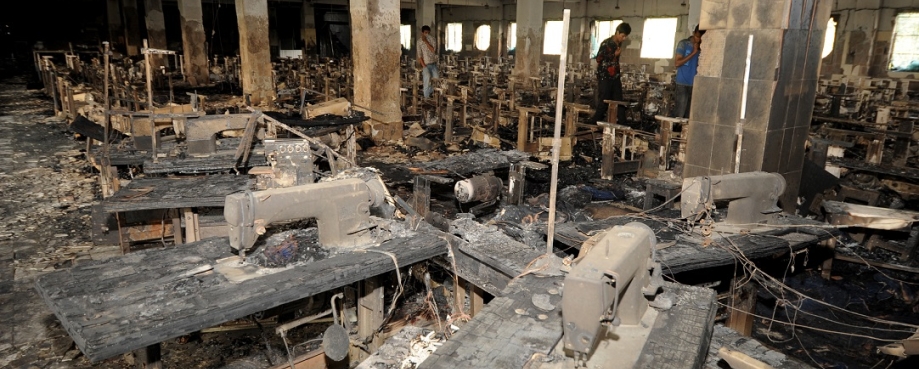
Today marks the 11th anniversary of Tazreen Fashions fire, one of the worst industrial disasters in the history of Bangladesh.
This incident exposed the inadequacy of occupational health and safety measures in Bangladesh’s ready-made garment (RMG) sector to the world. A reality confirmed in the most painful way, by the collapse of Rana Plaza, less than a year later.
The fire at Tazreen Fashions killed over 100 people and left many more injured, some of whom live with disabilities as a result. Last night, the injured, family members of the deceased, and workers’ rights activists, gathered at the site of the incident, for a candlelight vigil to remember and pay respects to those lost.
Justice for survivors
The case of the Tazreen Fashions fire has still not been resolved in Bangladesh courts. Workers' rights activists have demanded a special tribunal for this case, to bring those responsible to account, seek treatment and rehabilitation support for the survivors, and secure financial support for the families of the deceased.
A report by the Ministry of Home Affairs’ investigative committee stated that the fire was "clearly a crime of causing death by negligence" and recommended "prosecution under section 304 (a) of the penal code". All evidence pointed to gross negligence from the owners and management of Tazreen Fashions, in ensuring the safety of workers.
Never again
The Tazreen fire shook the sector, from suppliers, civil society, trade unions and government bodies in Bangladesh, to brands, retailers, multi-stakeholder initiatives (MSIs), trade unions and consumers worldwide. Commentary highlighted the need for more accountability to ensure the safety and security of the sector’s workers. Despite the global outcry that followed, Rana Plaza collapsed a mere four months later.
Rana Plaza triggered industry-wide collaboration and practical action to ensure a safer and secure workplace in Bangladesh’s RMG industry. The ACCORD and Alliance were established to support and monitor these issues. The ACCORD, which later became RMG Sustainability Council, provides training, auditing, and grievance support in the sector. The efforts of MSIs, civil society, business associations, buyers and suppliers resulted in substantive improvements across the industry, but there remains much more to do.
Driving progress on occupational health and safety
Resolving these issues across global supply chains will take a journey of continuous improvement. In Bangladesh, training on occupational health and safety issues, implementation of local labour law, oversight from government inspection bodies and monitoring from the buyers’ side are crucial. Support from civil society and MSIs can play a critical role in this journey.
Building the appropriate facilities, training, and dialogue for and between workers and management is paramount. In both cases, at Tazreen Fashions and Rana Plaza, it was observed that workers’ concerns about health and safety were not heard before the disasters occurred. If management and factory owners had engaged with worker's concerns, huge loss of life could have been avoided.
ETI began work in Bangladesh shortly after these two disastrous events. We found that beyond facilities, there is a definite need for worker's participation and workplace dialogue to wipe out, or at least to reduce such events in the future. ETI’s flagship social dialogue programme has successfully identified and resolved workplace risks through dialogue in more than a hundred factories in Bangladesh. Alongside this work, ETI Bangladesh delivers regular occupational health and safety training in factories across Dhaka.
Visit the ETI Bangladesh website for more on our work protecting workers’ rights across the country.
